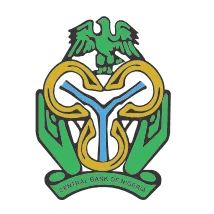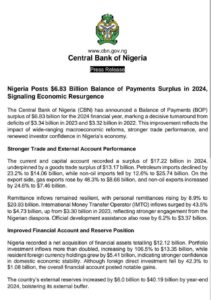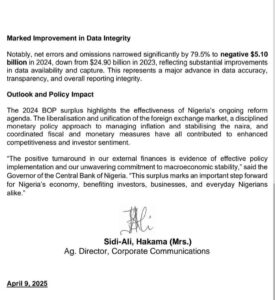CBN Posts $6.83bn BOP Surplus, 42.3% Dip In FDI For 2024

The Central Bank of Nigeria (CBN) has announced a significant Balance of Payments (BOP) surplus of $6.83 billion for the 2024 financial year, despite a notable decline in Foreign Direct Investment (FDI) by 42.3 per cent. This marks a dramatic reversal from the BOP deficits of $3.34 billion in 2023 and $3.32 billion in 2022, signaling positive strides in the country’s economic outlook.
The CBN’s 2024 BOP report, released on Wednesday, highlights the role of Nigeria’s ongoing macroeconomic reforms, strong trade performance, and renewed investor confidence. Although FDI faced a sharp contraction, other areas such as trade, remittances, and financial flows showed remarkable growth, contributing to the overall surplus.
A major driver of the surplus was Nigeria’s current and capital accounts, which posted a combined surplus of $17.22 billion in 2024. This was due to a goods trade surplus of $13.17 billion, supported by a 23.2 per cent reduction in petroleum imports to $14.06 billion and a 12.6 per cent drop in non-oil imports, amounting to $25.74 billion. On the export side, gas exports surged by 48.3 per cent to $8.66 billion, while non-oil exports also grew by 24.6 per cent, reaching $7.46 billion.
Remittance inflows played a crucial role in bolstering Nigeria’s external finances. Personal remittances rose by 8.9 per cent to $20.93 billion, and remittance inflows through International Money Transfer Operators (IMTOs) experienced a significant 43.5 per cent increase, totaling $4.73 billion in 2024, up from $3.30 billion in 2023. Additionally, official development assistance grew by 6.2 per cent to $3.37 billion, further supporting the country’s external balance.
While financial flows were largely positive, FDI declined significantly by 42.3 per cent, dropping to $1.08 billion. Despite this setback, the overall financial account remained strong, with net acquisition of financial assets amounting to $12.12 billion. Portfolio investment inflows increased 106.5 per cent, reaching $13.35 billion, and resident foreign currency holdings grew by $5.41 billion, indicating improved confidence in the Nigerian economy.
Nigeria’s external reserves also showed solid growth, increasing by $6.0 billion to $40.19 billion by the end of 2024. This rise strengthens the country’s external buffer, enhancing its resilience against global financial pressures.
A particularly notable improvement in the report was the sharp reduction in net errors and omissions, which dropped by 79.5 per cent to -$5.10 billion, compared to -$24.90 billion in 2023. This decline reflects significant improvements in data accuracy, transparency, and the overall quality of economic reporting.
The CBN attributed the positive BOP outcome to the effectiveness of Nigeria’s policy reforms, including the liberalization and unification of the foreign exchange market, the implementation of tighter monetary policies to curb inflation, and coordinated fiscal measures aimed at stimulating economic growth.
“The positive turnaround in our external finances demonstrates the success of our reform agenda and our unwavering commitment to maintaining macroeconomic stability,” said the Governor of the Central Bank of Nigeria. “This surplus is a pivotal milestone for the Nigerian economy, bringing tangible benefits to investors, businesses, and citizens alike.”
However, while the BOP surplus signals progress, the significant drop in FDI remains a critical challenge. The decline of 42.3 per cent in FDI highlights the need for Nigeria to address deep-rooted concerns that continue to discourage foreign investment. Key among these are issues of policy inconsistency, regulatory uncertainty, and infrastructural bottlenecks that impede business operations.
To improve FDI, Nigeria must prioritize creating a more stable investment environment by ensuring policy continuity and transparency. Addressing security concerns, improving infrastructure, and reducing the cost of doing business will be crucial in attracting foreign investors. Additionally, more targeted incentives for key sectors such as technology, manufacturing, and renewable energy could play a significant role in reversing the FDI decline.
Nigeria’s FDI potential remains high, but sustained efforts are required to restore investor confidence. Only by addressing these structural challenges will Nigeria be able to capitalize on its economic growth and fully unlock the benefits of foreign investment in the years ahead.







